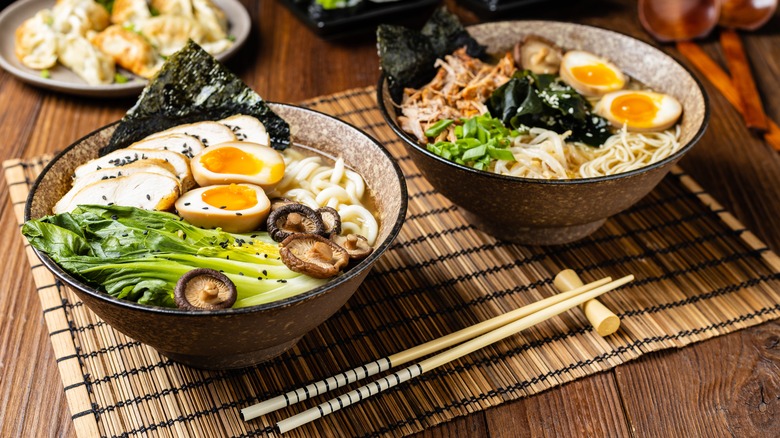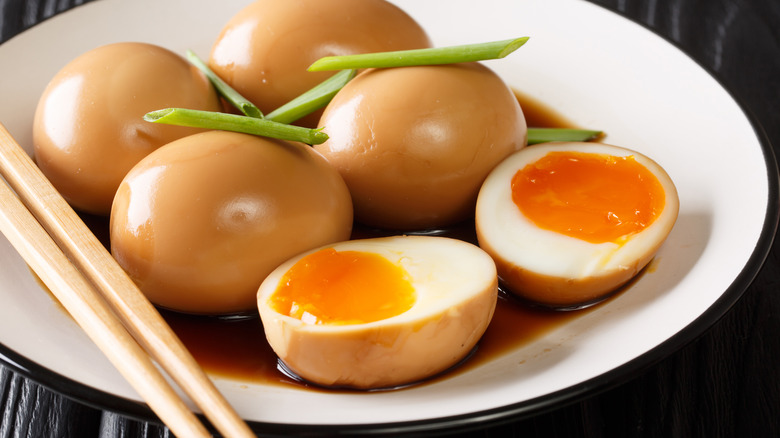Soy-Marinated Eggs Are The Topping Your Ramen Has Been Missing
We may receive a commission on purchases made from links.
Ramen eggs, soy-marinated eggs, or ajitsuke tamago (Japanese for "seasoned eggs") — they've got as many names as ways to eat them, but one of the best places for these marinated soft-boiled eggs is nestled on a mound of ramen. Steeped in a sweet and savory marinade of soy sauce and mirin, these eggs are an explosion of umami flavors. A bite rewards you with initial notes of sweet soya sauce on the egg's silky outer layer, giving way to a rich, jammy yolk, all combining into a highly snackable situation. Make a batch, and you may end up finishing these soy-marinated eggs before you get around to making that homemade ramen.
However, you'd do well to wait since eggs and ramen are a match made in foodie heaven. There are several ways to use regular eggs to level up instant ramen, but leave them to marinate for as little as 4 hours and things start tasting seriously gourmet. The longer you marinate, the firmer the egg's insides become, and the more the flavors seep in. Once removed from the marinade, you can store these eggs in the fridge for about a week, so make a substantial batch and enjoy them on their own, or atop a brothy bowl.
Preparing soy-marinated eggs
Perfect soy-marinated eggs start with soft-boiling them very precisely —for six minutes at a simmer rather than a rolling boil; eggs cooked at higher temperatures tend to develop chewy whites. Once boiled, transfer them to an ice bath to stop further cooking; this will ensure you get a nice semi-liquid yolk.
@vernahungrybanana These soy marinated eggs are so so so easy to make but so addctive and delicious!! P.s. ramen recipe coming soon! #eggs #easyrecipe #japanese #foodtiktok #yum #fyp
Peeling soft-boiled eggs can be a chore, especially with large batches. Thankfully, there are a few hacks to help. Add a tablespoon of vinegar to the boiling water to soften the shell. Combined with the shock of the ice bath, those shells will be ready to fall off. To move things along even faster, use the water hack to peel eggs without damaging the delicate whites. A wide spoon can also help get larger chunks of the eggshell off.
The marinade has just a few ingredients — water, soy sauce, and mirin. Adding some sake to the mix brings complexity to the flavor, and a few pinches of granulated sugar helps balance the acidity. If mirin isn't available, the sweet, mellow notes of sherry vinegar will do the job as well. Remember to simmer the marinade until all the alcohol smells have evaporated, then bring it to room temperature before pouring it over the soft-boiled eggs. Four hours of marination packs a good amount of flavor, but anything more than 12 hours risks the eggs getting tough and chewy.
Eggs and ramen are essential companions
Ramen noodles are typically low in protein, which is why a bowl is better topped with meat, fish, tofu, or egg. The latter is often the easiest, so you'll invariably see the two together. With soy-marinated eggs, adding that essential and delicious protein component becomes even easier because all you have to do is cut one in half and place it atop the bowl. (If you have an Asian market nearby, or don't mind getting them on your doorstep, these make great ready-made add-ins.)
You can even tweak the marinade to your tastes by adding a few aromatics and spices. A similar Korean preparation called Mayak Gyeran (which fittingly translates to "drug eggs") packs even more flavor by using garlic, green onion, chilies, and sesame oil in a soy marinade. The complex flavors infused in the egg can help elevate the simplest bowls of ramen, cold noodle salads, and even fried rice, making them great for weeknight meals.
Speaking of quick weeknight meals, another great way to combine ramen and eggs is to use leftover broth to make ramen broth eggs in the microwave. The complex flavors of ramen broth help season the eggs, resulting in a steamed egg dish similar to the Japanese chawanmushi. As long as you've got some seasoned marinated eggs or a flavorful broth in the fridge, making a bowl of umami-rich deliciousness is much easier than it seems.


